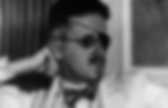

Was James Joyce the Greatest Mind-Scientist Ever? I bought a Kindle recently, and excitedly downloaded free stuff: Stevenson’s Dr.

Jekyll and Mr. Hyde (not as good as I remembered), stories of H.P. Lovecraft (like a parody of Poe, but good for bedtime) and, finally, James Joyce’s Ulysses, released in full (a journal published chunks beginning in 1918) in 1922. I trekked through Ulysses in college 30 years ago under professorial guidance and wanted to revisit it to see how it holds up. It holds up just fine. Home Fweet Home. Finnegans Web. TOC - FinnegansWiki. The Jung & The Restless. “Dreams are the Sea-Monkeys of consciousness; in the back pages of sleep they promise us teeming submarine palaces but leave us, on waking, with a hermetic residue of freeze-dried dust.” ~ Michael Chabon Some guides on the Journey:A Skeleton Key to Finnegans Wake by Joseph CampbellJoyce’s Book of the Dark by John BishopThe Books at the Wake by James S.
Atherton “I began, thinking that if I could explain the book to a seven-year-old, I might have some hope of explaining it to myself . . . The consensus reply, safe and broadly unmistaken, akin to going with “representative government” when asked to explain the point of the American Revolution, would be that Finnegans Wake attempts to recreate, by means of an invented language that Joyce derived from English, the flow and the flavor of a single night as it passes within the fitful, sleeping consciousness of a Dublin tavernkeeper named Earwicker or possibly Porter.” Gordon Bowker’s ‘James Joyce’: Portrait of the author as a man.